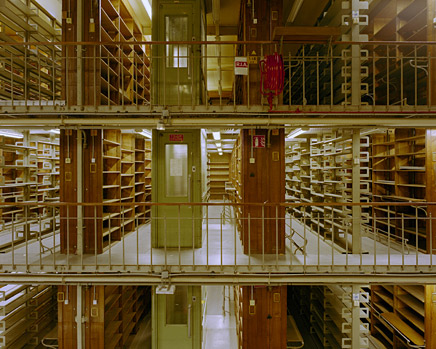removal: toute la mémoire du monde
full access to information, knowledge and their preservation
trieste, studio tommaseo
And of course, the information society’s very life blood is freedom.
It is freedom that enables citizens everywhere to benefit from knowledge,
journalists to do their essential work, and citizens to hold government accountable.
Without openness, without the right to seek, receive and impart information and ideas
through any media and regardless of frontiers,
the information revolution will stall, and the information society we hope to build will be stillborn.
Kofi Annan
REMOVAL, Friday 18th April 2008, 6pm, is a parallel event of The International Science Media Fair of Trieste (FEST), co-produced by Trieste Contemporanea and the Friuli Venezia Giulia section of Amnesty International in collaboration with the ACM of Venice and the Galerie EIGEN + ART (Leipzig/Berlin). It is edited by Giulio Cok, in the European Year of the Intercultural Dialogue and on the 60th anniversary of the Universal Declaration of Human Rights. This event is part of the Continental Breakfast project and is organized along with videospritz 2008, encounters with international video art, that the Commitee has been promoting for many years. It is supported by Casa dell’Arte and is realized in collaboration with the UNESCO Centre of Trieste, the L’Officina and Studio Tommaseo associations.

Toute la mémoire du monde/The world’s knowledge/Alles Wissen dieser Welt
There are indications of a time, when all riddles will be solved, a time, when this universe and others will deliver their keys. And this is simply because their readers, who are facing a piece of universal knowledge, will bit by bit find fragments of the same secret, that has a very beautiful name and calls itself felicity.
(in Alain Resnais movie "Toute la mémoire du monde", 1956)
The old Bibliothèque Nationale de France in the centre of Paris is currently vacant in major parts. The 11 floors of the stockroom and a capacious reading room are left unexploited.
In 1956 this library was the setting for a movie of Alain Resnais, the director of "Hiroshima mon amour” and "L’année dernière à Marienbad". In his 20 minute documentary "Toute la mémoire du monde” Alain Resnais shows how the library functions as a storehouse of the world’s knowledge; how, on an ordinary day books, magazines, plans and other treasures arrive, get catalogued and find their way into the archives, to be thus available for the reader in the reading room, who, as he says, internalises a part of the universal knowledge by reading and thus receives a "key”.
50 years later: We find the location vacated. An apocalyptic scenery. The knowledge has vanished. The pictures of the empty reading room and the empty stockroom immediately imply the loss of that "key”, the gateway to knowledge.
Analogous to the movie by Alain Resnais we filmed the location using slow tracking shots. In a double projection thousands of stocking room shelves without books flash by and in the reading room the camera merely captures a handful of young people, whiling away their time. Amongst the waiting people the withdrawal of knowledge provokes first signs of resentment, first signs of rebellion.
Nina Fischer, Maroan el Sani, 2006